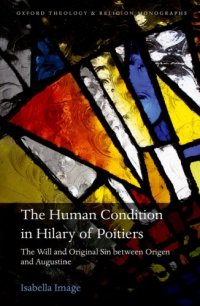
Ebook: The human condition in Hilary of Poitiers: the will and original sin between Origen and Augustine
Author: Saint Archbishop of Canterbury Augustine, Pictaviensis Hilarius, Saint Bishop of Poitiers Hilary, Image Isabella Christine, Origen
- Tags: Sin--Christianity, Sin--Christianity--Early works to 1800, Theological anthropology--Christianity, Theological anthropology--Christianity--Early works to 1800, Theologische Anthropologie, Criticism interpretation etc., Early works, Hilary -- Saint Bishop of Poitiers -- -367, Origen, Augustine -- Saint Archbishop of Canterbury -- -604, Bible. -- Psalms CXVIII -- Criticism interpretation etc, Augustine -- Saint Archbishop of Canterbury -- -604?, Hilary -- Saint Bishop of Poitiers -- -367?, Hi
- Series: Oxford theology and religion monographs
- Year: 2017
- Publisher: Oxford University Press
- City: Oxford
- Edition: First edition
- Language: English
- pdf
Introduction -- Hilary's commentary on Psalm 118 -- Body and soul -- The human as Imago Dei -- The fall -- Constraint (1) : Voluntas -- Constraint (2) : thoughts and passions -- Original sin -- Hilary between Origen and Augustine.;While he is more commonly known for his Trinitiarian works and theology, this study assesses mid-fourth-century bishop Hilary of Poitiers' view of the human condition. Isabella Image shows that the Commentary on Psalm 118 is more closely related to Origen's than previously thought. Image explains how his articulations of sin, body and soul, the Fall and the will all parallel or echo Origen's views in this work, but not necessarily in his Matthew Commentary. Hilary has a doctrine of original sin ('sins of our origin', peccata originis), which differs from the individual personal sins and for which we are individually accountable. He also articulates a fallen will which is in thrall to disobedience and needs God's help, something God always gives as long as we show the initiative. Hilary's idea of the fallen will may have developed in tangent with Origen's thought, which uses Stoic ideas on the process of human action in order to articulate the constraints on purely rational responses. Hilary in turn influences Augustine, who writes against the Pelagian bishop Julian of Eclanum citing Hilary as an example of an earlier writer with original sin. Since Hilary is known to have used Origen's work, and Augustine is known to have used Hilary's, Hilary appears to be one of the stepping-stones between these two great giants of the early church as the doctrines of original sin and the fallen will developed.
Download the book The human condition in Hilary of Poitiers: the will and original sin between Origen and Augustine for free or read online
Continue reading on any device:

Last viewed books
Related books
{related-news}
Comments (0)